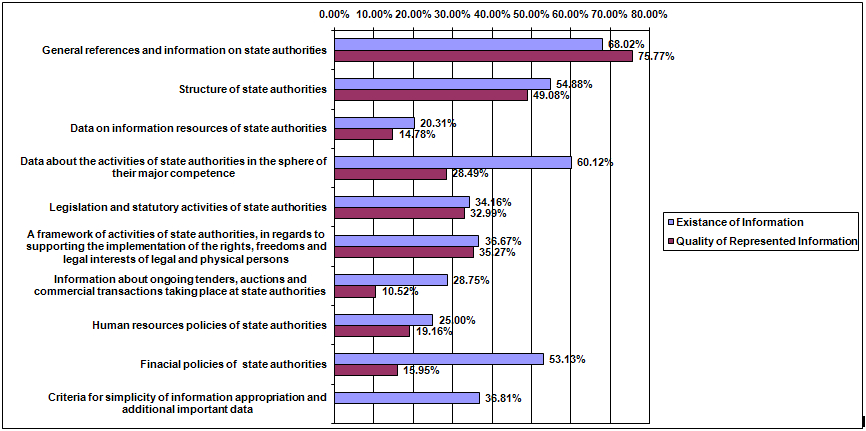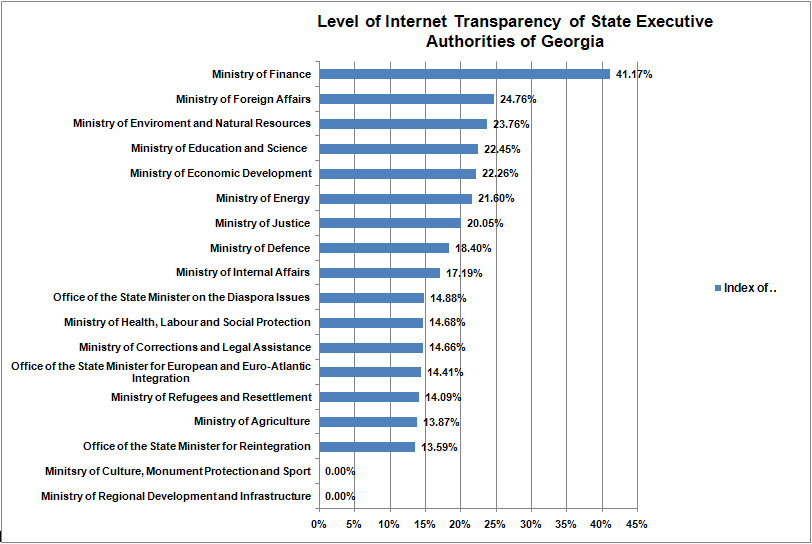



Project Title: Auditing of Official Web-Sites of Executive Authorities (Ministries) of Georgia-
Project Funded: the National Security Archive (George Washington University)
Project budget: $10 000.00
The Institute for Development of Freedom of Information worked on the project “Auditing of Official Web-Sites of Executive Authorities (Ministries) of Georgia, which was support and funded by the National Security Archive (George Washington University- $10 000).
In the framework of the project, the IDFI working group and invited experts of the Institute made research on Electronic Government in the world, the level and challenges of E-government, legislation about internet transparency and E-governance in Georgia. The IDFI working group performed an auditing of the official web-sites of the Ministries of Georgia, made a detailed analysis and assessed the level of transparency of the web-sites and introduced a ranking scale of the Ministries according to the level of transparency.
Please see the report of the project…
Auditing of Official Web-Sites of Executive Authorities of Georgia
Well-informed citizen is a foundation of a free community. Transparency of government activities is the best prerequisite for development of a country and accountability of state authorities before people.
Under the legislation of Georgia, requirements set in view of freedom of information apply to all state and self-governing bodies and institutions. Despite liberal laws, level of transparency of state structures still remains inappropriate. In addition to this, people are not fully aware of their possibilities to demand, search an obtain information on their own lawful rights. Besides, in many cases, even public officials have no full knowledge of the law on freedom of information.
Availability of public information is the major precondition for raising the confidence between the society and the government and improving the quality of transparency of state authorities.
In the modern world, internet has significantly facilitated communications between the government and society, promoted transparency of administration and regular public control over activities of the state authorities. Public has become more actively involved in the executive and legislative initiatives and programs proposed by the government and actions planned or implemented by the same. This is particularly important for population residing far away from the center in the regions of the country.
Achievement of the modern world such as a new information reality should necessarily be reflected in the Georgian laws. For instance, under current Georgian legislation, state authorities and structures are not obliged to make their own web-portals in internet. Consequently, state structures act according to their good will or opinion. Respectively, contents of the official web-sites of state authorities are not regulated by any statutory acts and frequently, they do not provide socially important information.
While internet-transparency is the most considerable component for functioning of the modern and democratic state, the development of the Georgian web-space will significantly promote realization of citizens’ rights to search, obtain and disseminate information. Apart from this, the government itself will have a unique opportunity to enjoy immediate contact with the population.
Realization of concept of electronic power and electronic governance will truly yield many benefits for the young Georgian state. This will raise efficiency of state authorities and at the same time it will promote public transparency of the government.
According to preliminary studies conducted by the Institute, majority of web-sites of the Georgian government agencies publicize incomplete and often delayed information on their activities, resolutions and actions. At the regional level, there are even more problems. Most of municipal agencies do not have web-sites at all, while existing web-sites provide only a small portion of available information. There is no common standard or resource-base.
Presented study is based on the methodology of monitoring the official web-sites of state agencies developed by the non-governmental, non-commercial organization “Institute for Development of Freedom of Information” operating in the Russian Federation (“ИнститутРазвитияСвободыИнформации”, Санкт-Петербург, РФ. www.svobodainfo.org). As a result of practical work through many years, the Institute has become well-experienced in monitoring of official web-sites of state agencies and evaluation of transparency. Along with the National Security Archive (The National Security Archive, George Washington University, Washington, DC. www.nsarchive.org), the Institute represents one of the first partners of our organization. Within the framework of a conference held in Telavi, Georgia through May 8-11, 2009 (http://freedominfo.org/news/20090522.htm), it was decided to set up a coalition of organizations (www.foi-eurasia.org) operating in the area of human rights and freedom of information across the former Soviet countries.
Methodology approved by the Institute for Development of Freedom of Information has been perfected and adapted to the Georgian reality. New approaches have been developed with consideration of competences and peculiarities of state executive agencies. We have also determined qualitative and quantitative characteristics of transparency of activities undertaken by the Georgian state executive agencies.
Purpose of the primary study conducted by the Institute was to find out as to what extent the state information resources are available and what portion of information is published on official web-sites of state authorities. Besides, qualitative indices of published information were rather important. At the initial stage of the study, only assessment was made aimed at detection of common challenges and existing shortcomings.
Web-sites of executive power were monitored (Initially, only web-sites of Ministries of Georgia). It is worth to note that official web-sites of two ministries, namely, Ministry of Regional Development and Infrastructure www.mrdi.gov.ge and Ministry of Culture, Protection of Monuments and Sport www.mcs.gov.ge were not functioning during monitoring (July-August, 2009) and it was impossible to conduct evaluation. Content analysis was made according to thematically grouped parameters classified into 11 blocks:
Block 1 – General references and information on the state authority;
Block 2 – Structure of the state authority;
Block 3 – Data on information resources of the state authority;
Block 4 – Data about the activities of the state authority in the sphere of its major competence;
Block 5 – Legislation and statutory activity of the state authority;
Block 6 – A framework of activities of the state authority, in regards to supporting the implementation of the rights, freedoms and legal interests of legal and physical persons;
Block 7 – Information about ongoing tenders, auctions and commercial transactions taking place at the state authority;
Block 8 – Staff policy of the state authority;
Block 9 – Financial policy of the state authority;
Block 10 – 11 – Criteria for simplicity of information appropriation and additional important data.
As a result of analysis, it can be concluded that information placed on official web-sites of state authorities is of a general nature and does not provide complete opinion on all aspects of their activities for the user. Information, like use of budget funds, information on available information systems, full analysis and data on accomplished and planned operations, law-making activity and staff policy, is presented absolutely incompletely.
Most of state authorities fail to understand that the web-site is an effective device for dissemination of complete information on their activities and an available alternative/base for citizens and organizations to use state information resources.
In addition, it should be noted that state authorities yet are not using internet as an effective way for interactive communication with citizens and organizations.
The only state authority that is represented in the internet space in form of not only informative web-site, but also through state service web-portal, is the Ministry of Finance of Georgia. Considering this fact, it is yet too early to talk about modern interactive governance in Georgia.
In order to ensure that state authorities have their own official web-sites with high quality parameters, they need to meet the four principal criteria:
Unfortunately, monitoring of official web-sites has proven that all examined web-sites have some shortcomings according to all four main criteria.
Institute for Development of Freedom of Information plans to continue its efforts in view of monitoring of official web-sites of state authorities.
Follow-up activities:
Detailed outcomes of monitoring and study of Georgian state web-space as well as developed recommendations will be published in the annual report of the Institute.

